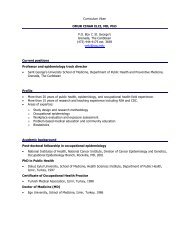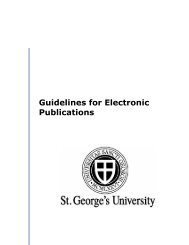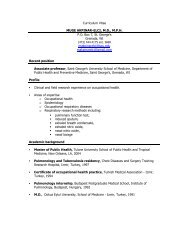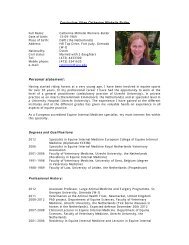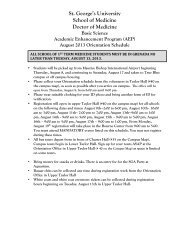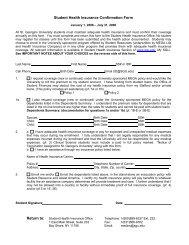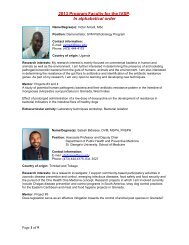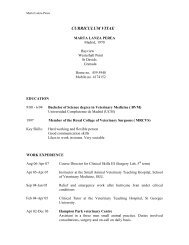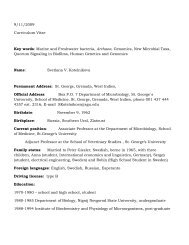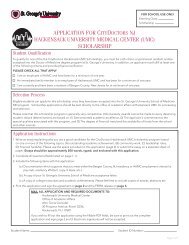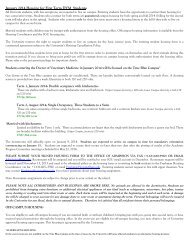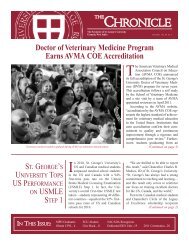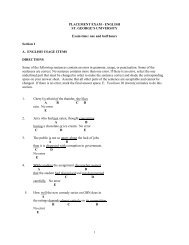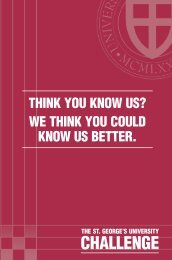SCHOOL OF 2012-2013 - St. George's University
SCHOOL OF 2012-2013 - St. George's University
SCHOOL OF 2012-2013 - St. George's University
Create successful ePaper yourself
Turn your PDF publications into a flip-book with our unique Google optimized e-Paper software.
major areas of cell, tissue, and organ system investigations,<br />
as they can be relevant to reinforce cell biology and<br />
histology knowledge. <strong>St</strong>udents are also introduced to<br />
principles of clinical histopathology. <strong>St</strong>udents are given<br />
the opportunity to critically read publications in these<br />
topics to discuss and review the reports or presentations of<br />
morphological data acquired in view of understanding their<br />
clinical implications.<br />
SCSK 527<br />
Applied Anatomy Using Ultrasound and Nerve Mapper<br />
Brian Curry, PhD<br />
Donny Shanahan, PhD<br />
This selective improves the anatomical knowledge of<br />
students in the second term of the four-year medical<br />
program by using cadaveric material to revisit the basic<br />
anatomy, and then using an ultrasound machine to view<br />
the internal structure on live volunteers of vital areas such<br />
as the neck and femoral triangle, and a nerve mapper to<br />
show the position of nerves and vessels in the living body in<br />
areas such as the neck, cubital fossa, and femoral triangle.<br />
The course uses new technology to show students the<br />
position of vital structures and reinforces the relevance of<br />
clinical anatomy.<br />
SCSK 528<br />
Clinical Professionalism in Sweden<br />
Cheryl Macpherson, PhD<br />
This intensive selective is hosted by a neurologist at<br />
Uppsala <strong>University</strong> in Sweden for 1 week.<strong>St</strong>udents build<br />
upon their professional competencies and skills while<br />
learning about conflict resolution, cultural competence, the<br />
Swedish health care system, and other topics. <strong>St</strong>udents<br />
interact with patients, doctors, and other medical students<br />
in clinical and classroom settings. They are assessed<br />
through team projects on the topics of their choice and<br />
presented conference style on the last day. Uppsala’s<br />
medical school is among the oldest in the world.<br />
SCSK 529<br />
Bioethics Today<br />
Cheryl Macpherson, PhD<br />
The selective is designed for students with an interest in<br />
bioethics who want to further develop their knowledge.<br />
It uses a seminar format to examineaspects of medicine,<br />
public health, research, environment, and other topics.<br />
Fifteen contact hours can be spread over several<br />
semesters in Grenada. These are led by faculty, visiting<br />
professors, and students. <strong>St</strong>udents in the Keith B. Taylor<br />
Global Scholars Program are encouraged to enroll and<br />
options for written assignments, sonic foundry, and/or<br />
teleconferencing will be provided. <strong>St</strong>udents are required to<br />
lead one seminar or journal club discussion during their last<br />
year in Grenada. Most sessions are held at noon as part of<br />
the Bioethics Grand Rounds Series.<br />
SCSK 530<br />
Forensics for First Responders<br />
Peter Giesler<br />
This selective acquaints future physicians, veterinarians, and<br />
law enforcement personnel with the underlying principles<br />
and concepts of modern forensic procedure. Emphasis<br />
is on preservation of evidence, securing of crime scenes,<br />
and proper maintenance of chain-of-custody of evidence.<br />
Through lectures, demonstrations, and practical exercises,<br />
students who successfully complete the course should be<br />
able to recognize a crime scene, take appropriate steps<br />
to secure the area, and preserve the integrity of the scene.<br />
<strong>St</strong>udents learn about types of physical evidence that may be<br />
found, how it is obtained, and how it is analyzed. The course<br />
covers legal procedures in the forensic sciences and specific<br />
groups that are involved in the scientific analysis of legal<br />
evidence.<br />
SCSK 531<br />
Community Health in Obstetrics and Gynecology<br />
Shazmi Khan, MD<br />
This selective involves integration and application of basic<br />
science knowledge with clinical medicine in obstetrics<br />
and gynecology. It is a one-credit course with eight<br />
lecture hours, including self-study and 14 clinical hours. A<br />
logbook needs to be kept. The topics to be covered will be<br />
mastered by self-study, lectures, and classroom interaction<br />
and demonstrations. The course includes one weekend at<br />
Carriacou Health Services (CHS) where clinical hours will<br />
encompass time in the operating room, examining room,<br />
and evaluation of patients in outpatient and inpatient<br />
settings, including imaging procedures.<br />
SCSK 532<br />
Current Topics in Medical Virology<br />
Amy Baldwin, PhD<br />
This selective is conducted in a journal club-type format,<br />
where students discuss and present current research in the<br />
area of medical virology. Course goals include reviewing<br />
current scientific literature in the area of medical virology;<br />
School of Medicine<br />
Course Descriptions<br />
School of Medicine Catalog <strong>2013</strong>–2014 | 71



